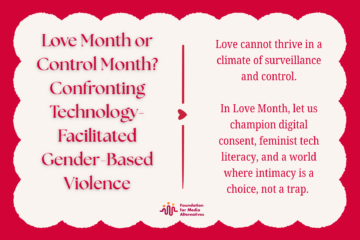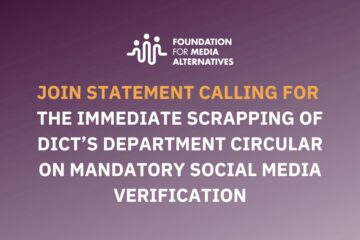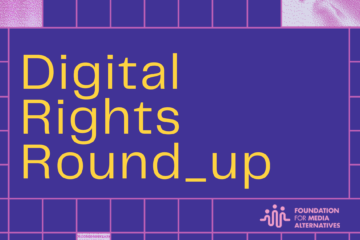[PRESS RELEASE] ASEAN Civil Society Urges Transparency and Public Engagement in Digital Economy Framework Agreement Talks
Kuala Lumpur/ Jakarta / Manila / Bangkok: 24 November 2025 — The 15th meeting of the ASEAN Digital Economy Framework Agreement (DEFA) Negotiating Committee is scheduled to take place from 24 to 28 November in Kuala Lumpur.
Civil society organizations from across ASEAN reiterate calls for greater transparency and meaningful public engagement in the ongoing negotiations of the DEFA, a major regional trade agreement that aims to establish binding and enforceable digital rules among ASEAN Member States.
In a joint letter delivered on 23 October 2025, digital rights groups, labor organizations, consumer advocates, and regional public interest networks expressed concern that the DEFA is moving forward without meaningful civil society participation, public consultation, or access to draft texts.
“This agreement has been heavily promoted as a driver of regional integration and economic growth, setting the rules for data, platforms, artificial intelligence (AI), and digital trade,” said Bhima Yudhistira Adhinegara, Executive Director of the Center of Economic and Law Studies (CELIOS), Indonesia. “But given the scale of its promised impact, it’s essential that the people of ASEAN know what’s in it, and that the negotiation process reflects ASEAN’s commitment to being people-oriented and people-centered.”
The DEFA is expected to address key issues such as data free flows, AI, digital IDs, and emerging technologies. Civil society groups are concerned that the agreement could reinforce tech monopolies and limit governments’ ability to ensure the following:
- Robust data privacy and governance protections to prevent the prioritization of unrestricted data flows over citizens’ personal information rights;
- Preservation of government regulatory space, especially the ability to access and audit source code and algorithms critical to combating bias, discrimination, and ensuring digital governance in essential sectors such as finance, telecommunications, energy, and transportation;
- Strong consumer protection tailored to digital-era challenges, including safeguards against predatory algorithms and data exploitation.
ASEAN negotiators have signaled their intention to conclude the agreement in 2026.
A key reference point in the negotiations is a study by the Boston Consulting Group (BCG), commissioned by the Australian Government, which projects that the DEFA could contribute USD 1 trillion in economic gains for the region. However, civil society groups note that the full study, including its methodology and assumptions, has not been released publicly.
“Why is a foreign government funding the economic modelling for ASEAN’s most important digital agreement?” asked Mohideen Abdul Kader, President of the Consumers’ Association of Penang in Malaysia. “If this figure is motivating the ASEAN negotiators to sign, then the people of ASEAN have a right to see the details including the assumptions and methodology, not just the BCG slide deck”.
The letter urges ASEAN Member States to ensure that all relevant stakeholders, including civil society, labor groups, and small businesses, have an opportunity to contribute meaningfully to this important regional initiative.
It recommends several concrete steps, including:
- Publishing the ASEAN mandate for the DEFA, the negotiating texts, and country submissions;
- Releasing the full BCG study, including its assumptions and methodology;
- Creating structured mechanisms for civil society participation at both regional and national levels;
- Holding stakeholder engagement events during the negotiation rounds;
- Disclosing interactions with industry stakeholders and third-party advisers, in line with ASEAN’s broader transparency goals.
“ASEAN’s vision of a digitally inclusive region will be strengthened by open dialogue, diverse perspectives, and broad-based public trust,” said Cornelius Damar Hanung, East Asia – ASEAN Programme Manager of FORUM-ASIA. “This is an opportunity to demonstrate leadership not only in digital policy, but also in open and accountable government”.
“The DEFA will have an effect on the everyday lives of ASEAN peoples thus there should be broader consultations. As it is, we are left in the dark because the text is not made public and participation is not open.” said Liza Garcia, Executive Director of the Foundation for Media Alternatives in the Philippines. “
“As the Philippines holds ASEAN Chairmanship in 2026, we remain firm that transparency and public participation must be upheld not just in our country, but the entire Southeast Asia. DEFA must put utmost importance on the call of civil society organizations as we are the ones who will be directly affected by it,” she adds.
ASEAN chairmanship will be held by the Philippines in 2026.
Contact information:
Karina Yong
Third World Network
twnkl@twnetwork.org
###
Access the letter and signatories here: https://www.twn.my/announcement/signonletter/Civil_Society_Letter_to_ASEAN_Member_States_on_the_Digital_Economy_Framework_Agreement2025.pdf



0 Comments